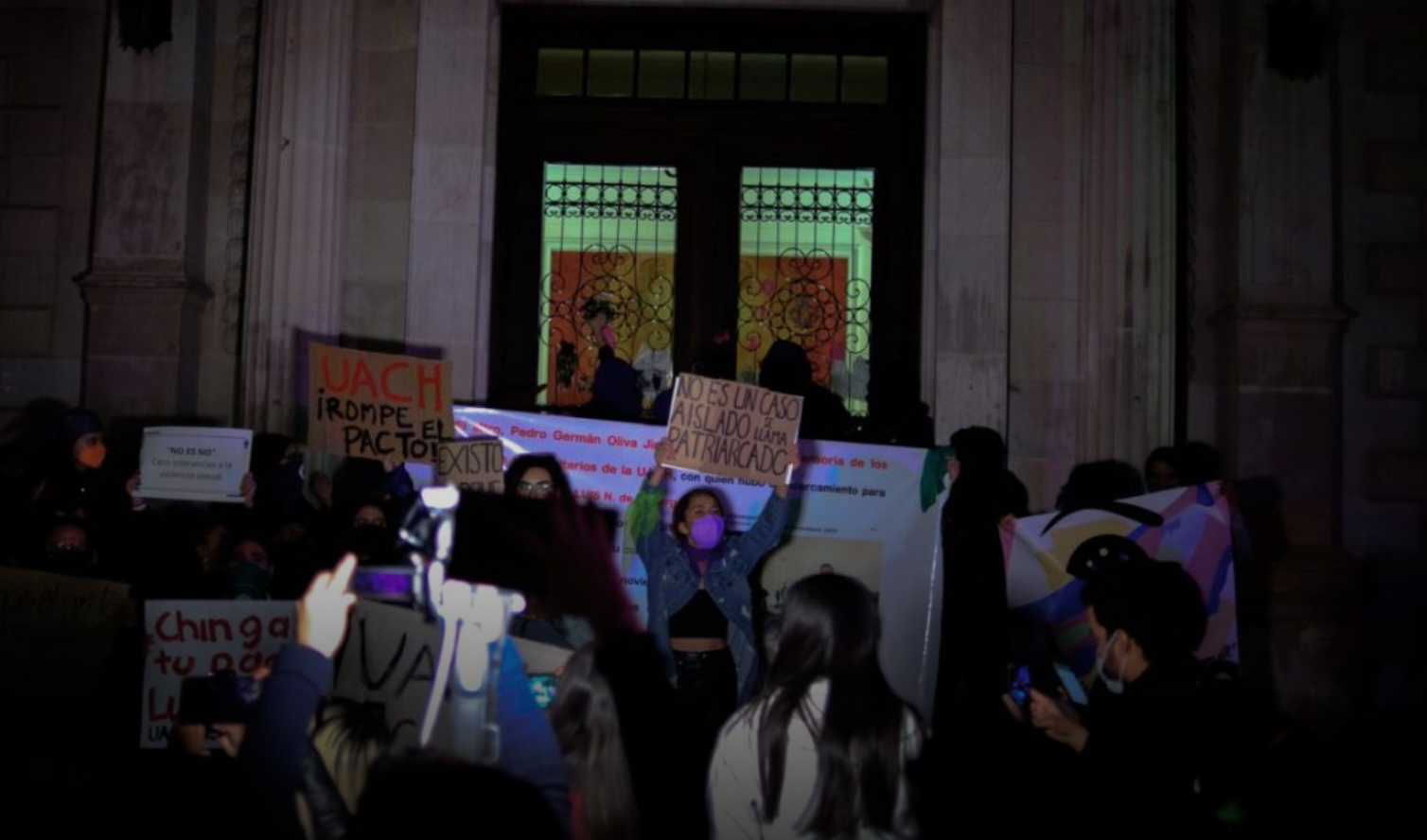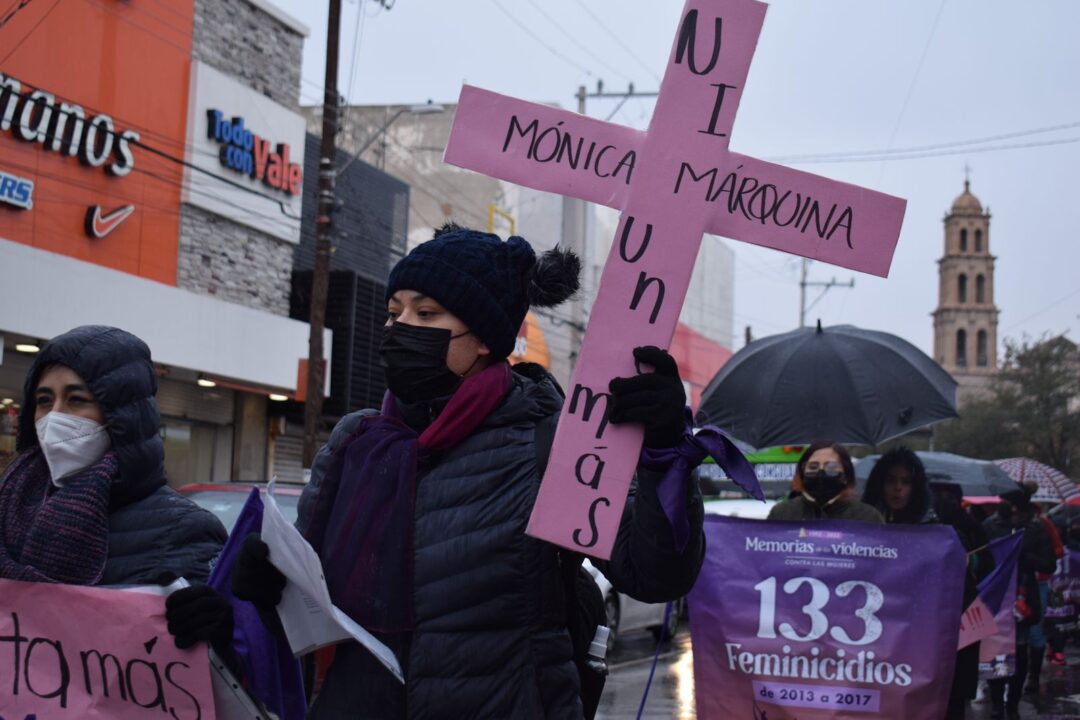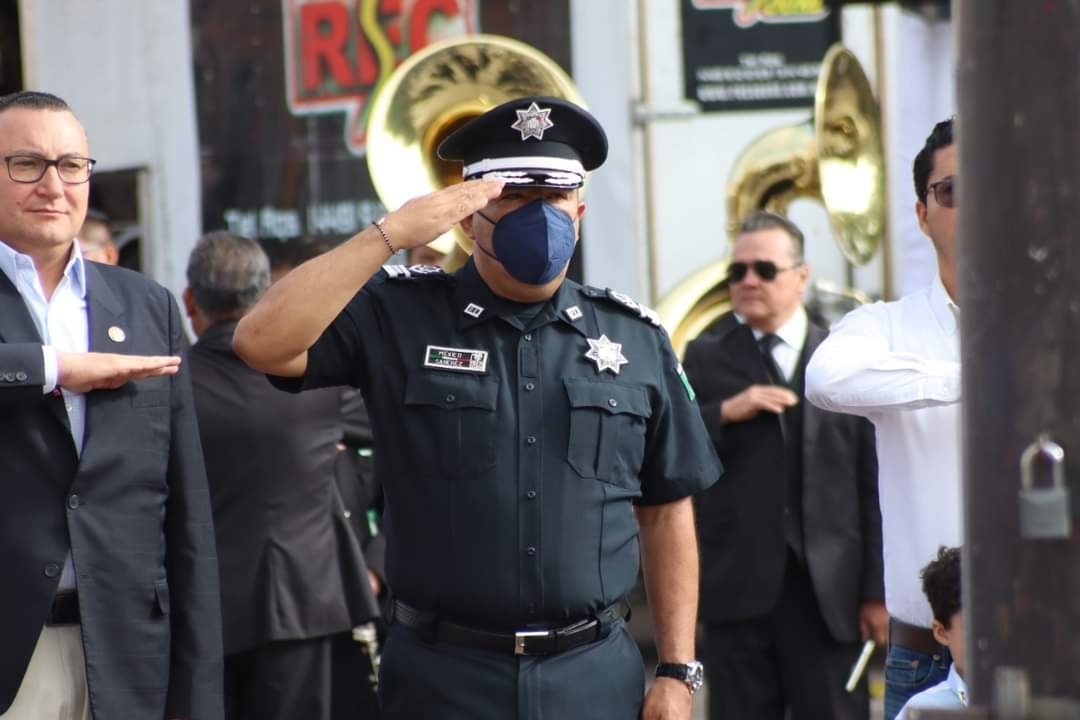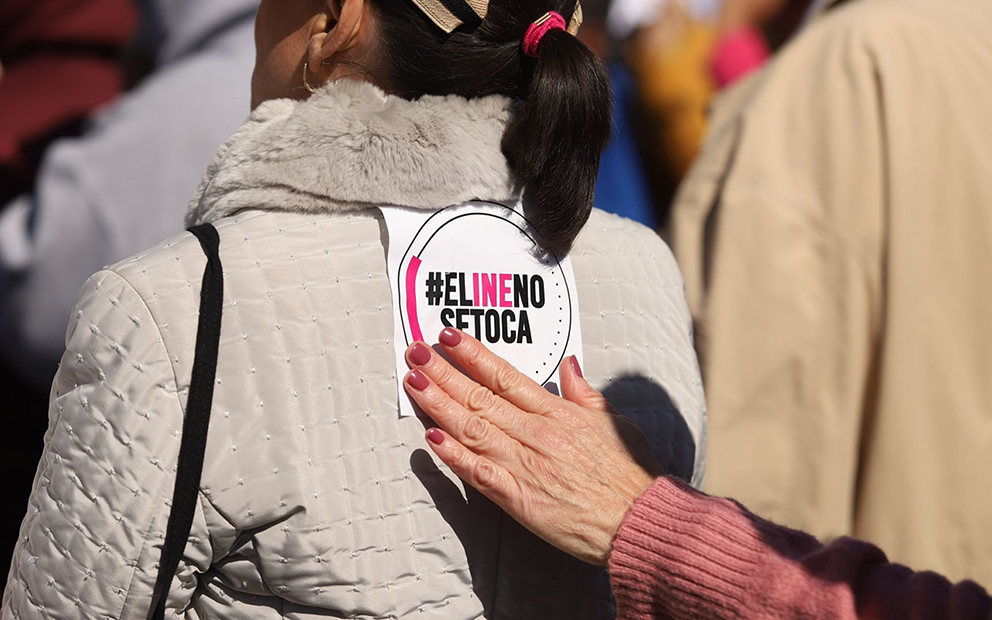Women leading Chihuahua’s government doesn’t guarantee our rights: feminists
3 diciembre, 2021

On November 25th, women and girls took the streets of Chihuahua City, to demand spaces without violence, respect for their rights, and justice for those who are no longer with us. Chihuahua state is now led by women, but in the opinion of many, there’s still little official support feminist struggle.
Text by Óscar Rosales for Raíchali, originally published November 26, 2021.
Photos by Raúl Fernando for Raíchali.
Translated by Dawn Marie Paley for Pie de Página in English.
Chihuahua City– To the call of chants like “State and church, two different things,” “Not one more,” and “Maru, you don’t represent me,” women and girls from throughout Chihuahua City took the streets on Thursday, November 25th, the International Day for the Elimination of Violence Against Women, to demand an end to all kinds of violence against women.
Collectives like Marea Verde, Mujeres al Grito de Libertad, Niñas en Resistencia, Unión y Fuerza de Mujeres Trans, Género Sin Fronteras and the Feminist training school, gathered at the famous roundabout to Francisco Villa on University Avenue. From there they marched downtown to arrive at the Cross of Nails, which is a tribute to the victims of femicide in the Chihuahua state.
There were two call outs for women and girls in Chihuahua, one celebrating the arrival of women to the heads of all three levels of state government, and another protesting violence. Both were similar in their energetic and constant demands towards the authorities who oversee the state.
In protest, one of the groups of women removed a banner put up by Chihuahua’s municipal government, at the place where the march started, which alluded to the end of violence against women.

Today, executive, judicial, and legislative power in Chihuahua state is led by women: Maru Campos is state governor, Georgina Bujanda is head of the state congress, and Miriam Martínez is the president of Chihuahua’s Supreme Court of Justice.
Regardless, most of the collectives that marched agreed that this doesn’t mean that there is going to be an improvement in the defense of women’s rights.
Campos and “conservative interests”
Many of the women marching were clear that Maru Campos being governor doesn’t translate into a victory for their movement.
“What we see is that we’re not a priority for her agenda,” said members of Marea Verde, who denounced a budget decrease for the defense and protection of women’s rights.

The collective, which fights for the decriminalization of abortion, also denounced the fact that Chihuahua’s state congress has failed to legislate on abortion after the Supreme Court of Justice (SJCN) found the criminalization of abortion unconstitutional.
They say Chihuahua’s congress is in the hands of conservatives, who are backed up by Campos.
In the same sense, they made clear that having three women in the most powerful positions of local government isn’t synonymous with feminism.
“The fact that she has a woman’s body doesn’t mean she works for the rights of women, they represent very specific interests, conservative interests that have their own agenda, which is to hold back women’s sexual and reproductive rights over our own bodies,” they said.
Speeding up and solving investigations, giving more funds to the Specialized State Attorney General for Women, and holistic and free sex education in every school are some of their other key demands.

According to data from the Division of Criminal Statistics of the State Attorney General’s office, from 2016 to 2019, 581 women were killed in the cities of Chihuahua, Ciudad Juárez, Cuauhtémoc, Parral and Guadalupe y Calvo.
That resulted in a Gender Violence Alert being declared in Chihuahua in August of 2021, which activists say isn’t being followed up on as required.
Meanwhile, some women in the march expressed that Campos has “an opportunity” to generate the changes that are being demanded
Autonomous University of Chihuahua protects sexual aggressors: activists
During the last part of the march, the collectives stopped at a building that is part of the Dean’s Office of the Autonomous University of Chihuahua (UACh), where they spray painted and wheat pasted photos of people who have been named in multiple complaints of harassment and sexual aggressions.

On one of the flyers was the name Pedro Olivas, he is the head of the UACh’s Office for the Protection of the Rights of Students. Olivas is accused of covering up for Luis “N,” a member of the university’s council who has multiple sexual assault accusations against him. The Women University Students’ collective is calling for him to be fired.
One of the banners in the march shows a photo of the two men that Olivas posted on social media, which his accusers interpret as a lack of empathy and commitment to the victims.
In an interview with Raíchali, the Mujeres al Grito de Libertad collective denounced that the working dialogues to deal with the accusations of women UACh students didn’t produce the results they had hoped for. They said there was an attempt to impose a patriarchal dynamic to discuss the issues, which they resisted. It was all for show, they said.
“The rector (Luis Fierro) was saying of course we are listening to you, of course we are open to solving this, but all the directors were on their cellphones, it was all a show, which we’re used to,” said members of the collective.
Mujeres al Grito de Libertad said their collective was formed in 2020 following the refusal of UACh authorities to attend to the complaints of sexual abuse against professors in the Faculty of Arts, as in the cases of V.H. and I.Q.

The case of I.Q. went before the Officer for the Protection of the Rights of University Students, but the resolution didn’t result in the firing of the professor or any other consequences, according to the collective.
The demands of trans women
Tania Lozano, who is part of the collective Unión y Fuerza de Mujeres Trans Chihuahuenses, was also in the march on November 25th. She said there is nothing to celebrate, and much to make up for with regards to trans women
“We have been brutally murdered in our homes, in the streets, at work… Some have been shot, others with knives, others have been burned and thrown from a train when we go to work the fields, because sometimes that is the only work we can access,” said Lozano.
According to data from the Fundación Arcoíris and the organization Letra Ese, in 2020 at least 43 trans women were killed in Mexico, which means that transfemicides represent 54.5 per cent of hate crimes against the LGBTTTIQA+ (Lesbians, Gay, Bisexual, Transgender, Transexual, Transvestied, Intersexual, Queer and Asexual) community.
“We are killed while alive too, we still can’t access many work opportunities without facing discrimination, even trying to access a bathroom can make us victims of verbal, physical and psychological violence.”
The key demands of this collective in Chihuahua include:
- The recognition of sex work as non-salaried work, which would allow sex workers to obtain the right to housing, social security and loans. Lozano said sex work is very stigmatized in society, but the lack of access to other work opportunities has caused many trans women to seek to sustain themselves in this way.
- The prohibition of conversion therapy for LGBTTTIQ+ people, which goes against their free development as persons.
- The official recognition of transfemicide in the penal code.
Just like other collectives, trans women said that with the arrival of Maru Campos to the office of the governor “they feel like they are in great danger.” They say that she doesn’t respect the secular state, and that she, like many others in Mexico, keeps “genitalizing her feelings.”
“The patriarchy continues to keep its foot on our necks, on our lives, trans women are being bombarded from all sides… Trans women are women, we are not going to stay silent, we don’t have anything to fear,” said Lozano.

The feminist march ended at the Cross of Nails, in front of the seat of government, where different collectives read statements about the violence that women are living in Chihuahua, and sang Vivir Quintana’s famous Canción sin Miedo.
This report was originally published by Raíchali, which is part of the Media Alliance organized by Red de Periodistas de a Pie. You can read the original here.
Click here to sign up for Pie de Página’s bi-weekly English newsletter.
Ayúdanos a sostener un periodismo ético y responsable, que sirva para construir mejores sociedades. Patrocina una historia y forma parte de nuestra comunidad.
Dona

















